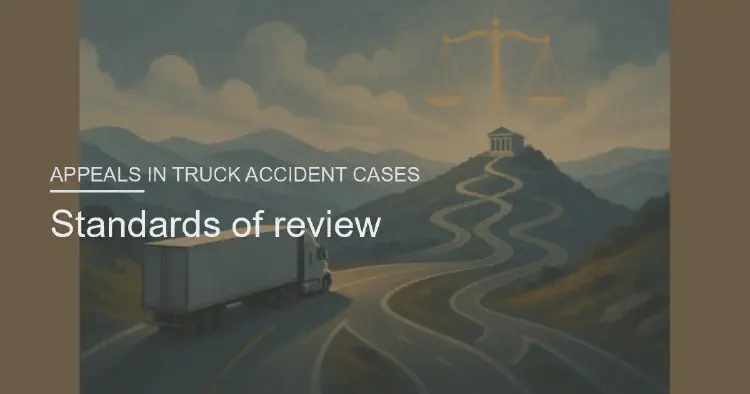Standards of review
When reviewing truck accident appeals, appellate courts apply different levels of scrutiny depending on the type of alleged error. These standards determine how much deference is given to the trial court’s decision.
- Truck Accident Law Team
- 2 min read
Article 4 of 6 in Appeals in Truck Accident Cases/

Standards of Review in Truck Accident Appeals
What Are Standards of Review?
- Legal frameworks that guide appellate courts in evaluating trial court decisions.
- Define how strictly appellate judges will scrutinize alleged errors.
- Ensure consistency and fairness across cases.
Common Standards of Review
-
De Novo Review
- Applied to pure questions of law (e.g., interpretation of trucking regulations).
- No deference to the trial court—appellate judges decide the issue anew.
-
Abuse of Discretion
- Applied when trial judges make decisions involving judgment calls (e.g., admitting or excluding evidence).
- Appellate court defers to trial judge unless decision was arbitrary, unreasonable, or outside legal bounds.
-
Clear Error
- Applied to factual findings made by the trial judge (e.g., credibility of witnesses).
- Verdict is overturned only if appellate judges are firmly convinced a mistake occurred.
-
Substantial Evidence Standard
- Used in reviewing jury verdicts.
- Verdict stands if supported by “substantial evidence” in the record, even if judges might have decided differently.
Application in Truck Accident Cases
- Legal Issues: Whether FMCSA regulations were applied correctly → de novo review.
- Evidentiary Rulings: Exclusion of black box data → abuse of discretion.
- Jury Verdict Challenges: Claim that damages were unsupported → substantial evidence standard.
Importance for Appeals
- Determines the difficulty of overturning a verdict.
- Plaintiffs and defendants must tailor appellate arguments to the correct standard.
- Misunderstanding the applicable standard can doom an appeal.
Summary: Standards of review dictate how appellate courts evaluate trial errors in truck accident cases. Depending on whether the issue involves law, discretion, or fact, courts apply de novo, abuse of discretion, clear error, or substantial evidence review.
You might also like:
- Tags:
- Black Box
- Box Data
- Trucking Regulations
- Trial Court
- Appellate Courts
- Trial Errors
- Jury Verdicts
- Fmcsa Regulations
- Appellate Court
- Appellate Judges
- Legal Issues
- Plaintiffs Defendants
- Trial Judge
- Application Truck
- Black Box Data
- Application Truck Accident
- Truck Accident Appeals
- Accident Cases Legal
- Interpretation Trucking Regulations